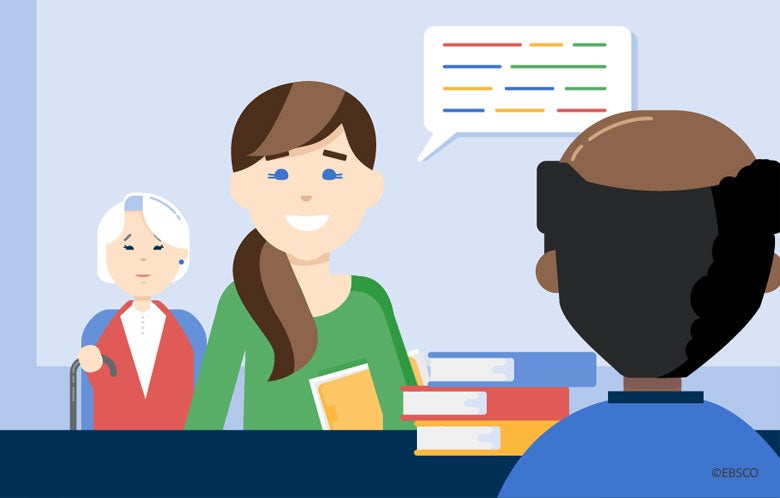When a person assumes the responsibility of caring for a loved one, the number and variety of questions that arise can be overwhelming, particularly for those providing end-of-life care for a loved one with a terminal illness. Caregivers share a common need for information, resources and emotional support. They need access to health information to better understand illnesses, conditions and diseases. They also need access to resources for managing the financial impact of caregiving, preparing their homes for the physical needs of their loved ones, administering prescription medications and arranging respite care.
According to a Pew Research Center report, 30 percent of adults in the United States provide support to a loved one, and most in this group are caring for an elderly parent or spouse. This community of caregivers consists largely of women (Fox & Brenner, 2012, p. 6), many of whom are still working full-time jobs. By 2030, “approximately 80 million Americans, or 20 percent of the population, are projected to be sixty-five or older, and 2.3 percent of the population will be eighty-five and older” (Bookman & Kimbrell, 2011, p. 118).
As the percentage of citizens caring for an elderly loved one increases, so will the need for easy access to relevant health care information and support services. Doctors and nurses are busy, and not all hospitals are equipped with robust patient education programs. This can present a challenge, especially when a person thinks of additional questions after leaving the doctor’s office.
As the percentage of citizens caring for an elderly loved one increases, so will the need for easy access to relevant health care information and support services.
Public Libraries Can Help
Public libraries ― which provide free access to computers and the internet ― are “perfectly poised” to address the growing information needs of caregivers because they are “essential community contacts in the quest for authoritative health information needed to address patrons’ questions. They hold the key to quality information portals and tailored services, thereby empowering their patrons to make more informed health decisions” (Dieterle and Becker, 2011, p. 135).
The American Library Association’s 2005 White House Conference on Aging Task Force recommended that libraries “act as catalysts to provide information literacy, materials, programs, technology, and training for older adults and their caregivers on issues of health care, consumer health, senior’s rights, and benefits both in the library and in the community with other groups and organizations” (Eastwood & Goldman, 2007, p. 58). Although librarians may need further reference training in consumer health, they ― as keepers of knowledge ― can direct caregivers to authoritative information resources.
Four Steps to Increasing Support for Caregivers
- Create and maintain a robust collection of information resources for seniors and their caregivers and provide opportunities to connect with health care professionals and other caregivers. The ALA offers a Caregiver’s Toolkit with links to resources, organizations and government agencies. EBSCO’s Consumer Health Ultimate database contains information on health and wellness topics. Don’t forget to connect caregivers with local respite care resources so that they can take time away from caregiving.
- Consider employing an elder services librarian, one who specializes in providing reference services and programs — such as computer training classes — to patrons 65 and older. (Public libraries often employ youth services librarians; why not elder services, too?)
- Offer a meeting space where caregivers can gather for regular support group meetings. During these meetings, librarians can periodically share resources with attendees at the start or close of each session. Many community websites, such as the Family Caregiver Alliance, offer informational webinars. Libraries could project these webinars onto meeting room screens for community viewing.
- To engage the caregiver community, increase your marketing and outreach activities so that patrons know which services are available to them. Print newsletters, e-newsletters, announcements in local newspapers and on the radio, and word-of-mouth can help you publicize these programs and services. LibraryAware contains templates and tools to create newsletters, flyers and more.
Providing the caregiver community with the information and support they need will help them to not only take better care of their loved ones, but also take better care of themselves.
[Last updated: 4/30/2025]
References
Bookman, A., & Kimbrel, D. (2011). Families and elder care in the twenty-first century. The Future of Children, 21(2), 117-140. Retrieved from http://www.jstor.org/stable/41289632
Dieterle, U. & Becker, C. (2011, May 24). Health information for the elderly and their caregivers: A training toolkit for public libraries. Journal of Consumer Health on the Internet, 15(2), 132-148.
Eastwood, E. J. & Goldman, B. (2007). Help your health! Establishing a consumer health program in a small public library. Journal of Hospital Librarianship, 7(2), 57-65. doi:10.1300/J186v07n02_05
Fox, S., & Brenner, J. (2012, July 12). Family caregivers online. Pew Internet & American Life Project. Washington, DC: Pew Research Center. Retrieved from https://www.pewresearch.org/internet/2012/07/12/family-caregivers-online/
